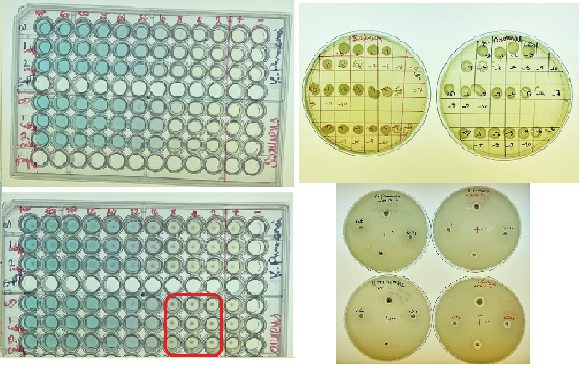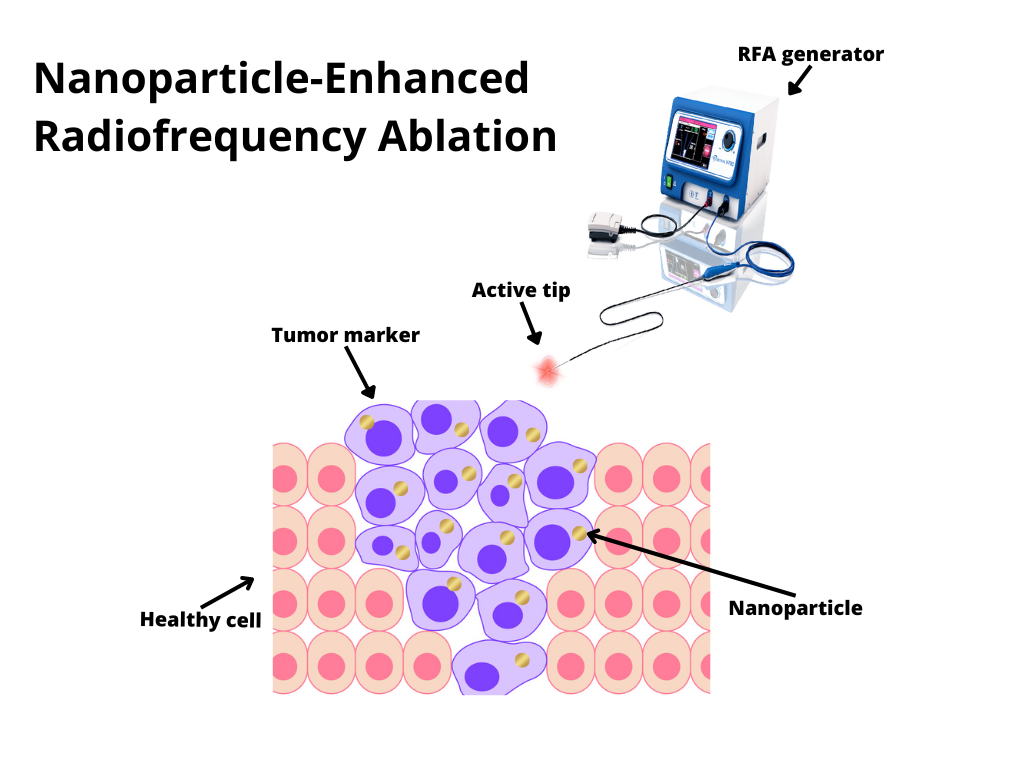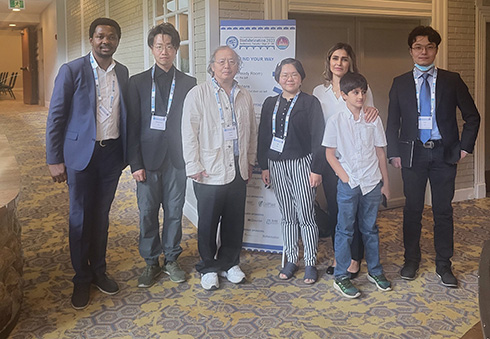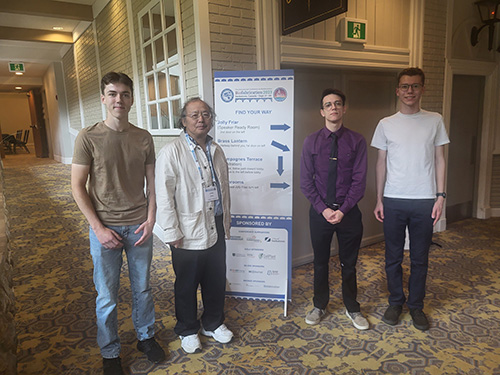The UnLIMITED CREATE Training Program is Canada's first initiative to train students in medical device innovation and entrepreneurship, incorporating engineering methodologies and Indigenous viewpoints.
The training fosters innovation and entrepreneurship to enhance health outcomes for all Canadians, Indigenous and non-Indigenous.
About the Program
Indigenous communities have a long history of using medical devices—in the Cree language, for instance, there is a word, natawihowin(ni), which is the act of providing healing medicine or using a healing tool.
The UnLIMITED CREATE Training Program is an impactful project that combines Indigenous and non-Indigenous knowledge to promote human health and well-being.
It offers immersive, innovative training and research experiences for undergraduate and graduate students.
Benefits of the Program:
- Opportunity to be part of a project combining Indigenous and non-Indigenous knowledge.
- Mentorship from academic scholars, Indigenous community leaders, and Canadian business leaders.
- Networking opportunities to enhance connections and support progress toward future goals.
- Training in Unconscious Bias, Anti-Racism, Anti-Oppression, and Equity, Diversity, and Inclusion (EDI).
- Annual retreat with expert talks and student posters.
Undergraduate students
The UNLIMITED CREATE Training Program provides a comprehensive learning experience for undergraduates, promoting systematic medical device innovation and entrepreneurship with a unique blend of engineering and Indigenous perspectives.
What UNLIMITED offers:
- A hands-on, bi-weekly paid summer internship to apply your theoretical knowledge.
- Intensive research training in the field of medical devices, encompassing design, manufacturing, and an understanding of human and cultural factors.
- Mentorship from leading academic scholars at prestigious institutions such as USASK (University of Saskatchewan), UBC (University of British Columbia), and the University of Waterloo, in addition to valuable insights from Indigenous community leaders and established Canadian business figures.
- A platform for networking that broadens your connections, supporting you in moving closer to your career objectives.
- The chance to develop and hone entrepreneurship skills through direct involvement in student-led projects.
- Comprehensive training in areas of Unconscious Bias, Anti-Racism, and Anti-Oppression to encourage a fair and inclusive environment.
- The opportunity to present your research and findings at the Undergraduate poster session, gaining feedback and insights from peers and experts alike.
Who should consider applying?
If you are a currently enrolled Usask undergraduate student in Biomedical, Healthcare related and Engineering fields, this program could be your next big step!
Application Window: Jan 1, 2024 - Mar 31, 2024
Program Duration: The program commences on May 1, 2024 and concludes on August 31, 2024.
All applications should be sent to info.unlimited@usask.ca
For any enquiries or questions about the program, please get in touch with program coordinator at info.unlimited@usask.ca
Graduate students
Core Training Components:
- Participate in research that is directly tied to the development of medical devices, which also offers significant commercialization potentials.
- Enrollment in two mandatory courses, namely "Creative Design in the Post-Truth Era" and "Entrepreneurship Excellence in Medical Devices in the Canadian Context," aimed at enhancing your understanding and skills in the sector.
- An immersive experience through a 4-week internship in Indigenous communities to gain firsthand understanding and insights.
- Earn a Professional Skills Certificate that emphasizes the role of Indigenous community knowledge in medical devices.
- Essential training in equity, diversity, and inclusion (EDI) to foster a more inclusive and equitable research environment.
- Participate in mentorship circles that aim at enhancing connections and supporting the progress towards your career goals.
- Opportunity to engage in an annual retreat featuring expert talks, student poster presentations, and networking events.
Supplementary Opportunities for UnLIMITED Fellows:
- Embark on an entrepreneurship journey with SIGMA (Saskatchewan Innovation Growth & Market Acceleration), a comprehensive training program tailored for burgeoning entrepreneurs in the field.
- Experience enhanced mobility opportunities to visit Indigenous communities, deepening your understanding of their unique knowledge systems and health practices.
- Secure internships with local industries, thereby gaining practical exposure and bridging the gap between academic learning and industry expectations.
Ideal Candidates for the Program:
- Currently, enrolled undergraduate students at the University of Saskatchewan from Biomedical, Healthcare, and Engineering fields, who have a strong interest in medical device innovation and entrepreneurship.
- Indigenous students who are keen to combine their cultural knowledge with advanced technological understanding for the betterment of healthcare practices.
- Ambitious students from any discipline who are eager to develop entrepreneurship skills, particularly in the domain of medical devices.
All applications should be sent to info.unlimited@usask.ca
For any enquiries or questions about the program, please get in touch with program coordinator at info.unlimited@usask.ca
Featured Student Innovations

Researchers:
V. Hosseini, A. Towobola, Q. Yang (Department of Mechanical Engineering, University of Saskatchewan), and J-L. Thomassin (Department of Biochemistry, Microbiology, and Immunology, University of Saskatchewan)
Key Takeaways:
Hospitals and healthcare facilities constantly look for ways to make their environments cleaner and safer. One of the innovative approaches undertaken by the team was to design surfaces, like doorknobs and handrails, that resist harmful bacteria. By embedding silver into a special coating, they developed a method that shows promising antibacterial properties. The goal? To drastically reduce infections that patients might get from touching these surfaces.
Visual Highlights:
Charts showing the efficiency of these new coatings in resisting bacteria and images comparing them with conventional coatings.

Researchers:
Lujia Ding, Chris Zhang (Division of Biomedical Engineering, College of Engineering, University of Saskatchewan), and Ningning Hu (School of Mechatronic Engineering and Automation, Shanghai University, China).
Key takeaways:
The human body is an intricate network of cells and tissues, all held together by a structure known as the extracellular matrix. Trying to recreate this matrix in the lab is a huge challenge, but it's one that offers many potential benefits, from studying diseases to testing new drugs. The team used a special 3D printing technique to make structures that can mimic this matrix, allowing cells to grow in a more natural environment. This breakthrough could pave the way for advanced medical treatments and further our understanding of human tissue.
Visual highlights:
Images of the 3D-printed structure, as well as cells growing within these new scaffolds.

Authors:
- Michelle Vargas Fernandez: M.Sc. Student, University of Saskatchewan
- Ildiko Badea: College of Pharmacy and Nutrition, University of Saskatchewan
- Michael Moser: Department of Surgery, College of Medicine, University of Saskatchewan
- Chris Zhang: Division of Biomedical Engineering, College of Engineering, University of Saskatchewan
Project description:
Hepatocellular Carcinoma (HCC) better known as ‘liver cancer’ is a silent malignancy that typically manifests symptoms during advanced stages. According to the Canadian Cancer Society's 2022 estimates[i], 3,500 Canadians would be diagnosed with liver cancer[ii]. Predisposing conditions include chronic viral hepatitis, high alcohol consumption, diabetes, and smoking. A range of treatments are currently available for HCC[iii], including liver transplantation, chemotherapy, and hepatic resection. Sadly, only a small portion of patients are candidates for the latter option. Among various techniques involving in situ tumor ablation, Radiofrequency Ablation (RFA) holds advantages due to its potential for refinement.[iv] However, RFA still encounters challenges, such as the utilization of an invasive needle and high dependence on the operator, thereby posing difficulties in treating tumors larger than 5 cm. Approaches to enhance heat conductivity in the tumor are needed. Our hypothesis suggests that functionalized gold nanoparticles targeted towards tumor cells, will exhibit higher rates of internalization in both 2D and 3D in HCC models. This enhancement[v] in internalization is anticipated to augment tumor cell ablation. The long-term aspiration is the development of nanoparticles designed to actively target tumors in HCC. This innovative[vi] approach stands to significantly benefit all Canadians, including First Nations patients dealing with substantial, inoperable tumors, presenting them with improved therapeutic options and the potential for a more favorable outcome.
References:
[i] Canadian Cancer Statistics Advisory Committee. Canadian Cancer Statistics 2022. Canadian Cancer Society; 2022: https://cancer.ca/en/research/cancer-statistics
[ii] Canadian Cancer Statistics Advisory Committee. Canadian Cancer Statistics 2022. Canadian Cancer Society; 2022: https://cancer.ca/en/research/cancer-statistics
[iii] Befeler, A. S., & Di Bisceglie, A. M. (2002). Hepatocellular carcinoma: diagnosis and treatment. Gastroenterology, 122(6), 1609-1619.
[iv] Ni, Y., Mulier, S., Miao, Y., Michel, L., & Marchal, G. (2005). A review of the general aspects of radiofrequency ablation. Abdominal imaging, 30, 381-400.
[v] Zhang, B., et al., Study of the relationship between the target tissue necrosis volume and the target tissue size in liver tumours using two-compartment finite element RFA modelling.
[vi] Bing Zhang, Michael A J Moser, Edwin M Zhang, Yigang Luo, Wenjun Zhang. A new approach to feedback control of radiofrequency ablation systems for large coagulation zones Int. J. Hyperthermia, 2014. 30(8): p. 593-602. 2017 Jun;33(4):367-377. doi: 10.1080/02656736.2016.1263365. Epub 2016 Dec 6.
NSERC CREATE Research Training Program Team
 |
Title: Distinguished Professor, University of Saskatchewan, Fellow of ASME and CAE. Expertise: Pioneer in advanced design theory, system theory and its application to medical device design and manufacturing with notable contributions in ventilators, biosensors, and rehabilitation robotics. |
 |
Title: Assistant Professor & Canada Research Chair (CRC) Tier 2, Ron and Jane Graham School of Professional Development. Expertise: Renowned for Indigenous engagement and community-based research with proficiency in Social Sciences, Social Impact Assessment, and Community-Driven Co-Design in Engineering. |
 |
Title: Esteemed Professor in Mechanical and Biomedical Engineering, College of Engineering, University of Saskatchewan. Expertise: Expert in the synthesis, properties and structures of advanced materials, including nanostructured thin films/coatings, and plasma/ion beam deposition. |
 |
Title: Associate Professor, Chemical and Biological Engineering, University of Saskatchewan. Expertise: Specializes in Membrane Science and Technology for Energy and Water Sustainability, Process Modeling, Simulation and Optimization of Complex Systems, and Nanomaterials for Advanced Technologies. |
 |
Title: Professor & Tier I Canada Research Chair in Microfluidic Technologies, University of Waterloo. Expertise: Leads the Waterloo Microfluidics Laboratory, focused on developing microfluidics enabled wearable technologies and tools for automated high-throughput analysis. |
 |
Title: Professor, Mechanical Engineering, The University of British Columbia. Expertise: Leading authority in Micro-electro-mechanical systems (MEMS) and biological applications thereof. |
 |
Title: Professor Emeritus, Johnson Shoyama Graduate School of Public Policy, University of Saskatchewan, Fellow, Royal Society of Canada. Expertise: Recognized for research on technical and scientific innovation in Canada, sub-arctic world development, and transformation of the Canadian university system. |
 |
Title: Associate Professor, General Surgery, University of Saskatchewan. Expertise: Specialist in Electroporation, Pancreatic Cancer, Kidney Transplantation, Tumor Ablation Technologies, and Biomedical Engineering. |
 |
Title: Associate Professor, Mechanical Engineering, University of Saskatchewan. Expertise: Renowned expert in material science and metallurgy with focus on the mechanical behavior of engineering materials and sustainable materials like natural fibre/bio-resin composites. |
 |
Title: Professor, Pharmacy and Nutrition, University of Saskatchewan. Expertise: Leader in the development of novel nanoparticle delivery systems and DNA-based biotechnology drugs. |
 |
Title: Associate Professor, Department of Chemistry, University of Saskatchewan. Expertise: Researcher focused on the development of highly porous materials for selective adsorption of contaminants from water. |
 |
Title: Professor, Department of Engineering Science, University of Oxford. Expertise: Noted authority in biomedical engineering with a focus on cerebral blood flow and metabolism. |
 |
Title: President & CEO, Baydo Development Corporation. Expertise: Entrepreneur with a PhD in Structural Engineering from the University of Saskatchewan, specializing in bridge damage detection. |
 |
Title: La Borde Chair in Engineering Entrepreneurship, Ron and Jane Graham School of Professional Development. Expertise: Authority in Engineering Entrepreneurship and Technological Innovation, Tissue Engineering, and Medical Instrumentation. |
 |
Title: Award-winning PhD student, University of Saskatchewan College of Medicine, Métis leader, and President of MedHack (+). Expertise: Developer of a novel gel to promote tissue growth for 3D printing of artificial organs for transplants. |
Image gallery
Dr. Zhang with students



